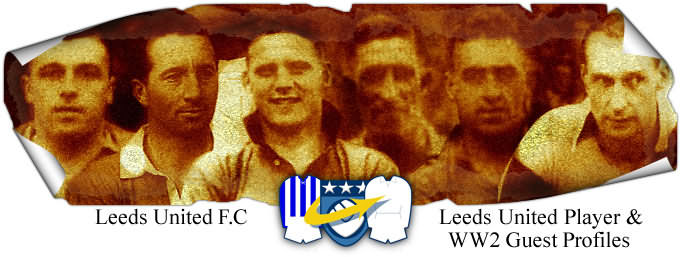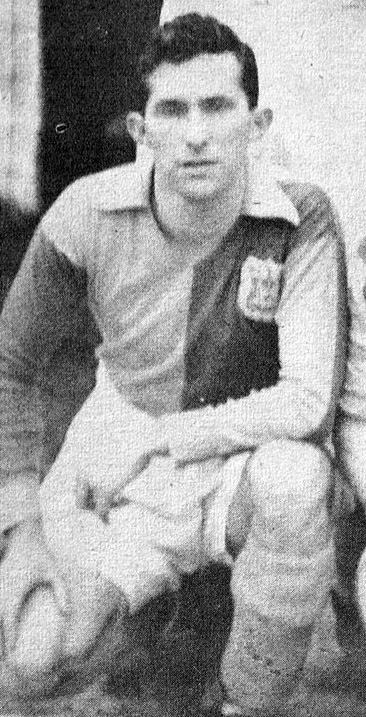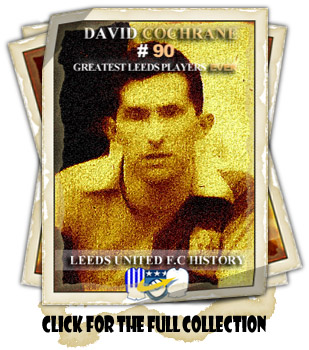

Cochrane: David Andrew (Davie)
1937-1950
(Player Details)
(Leeds United War-time Guest Player Details)
Outside Right
Born: Portadown, Co. Armagh: 14-08-1920
Debut v Derby County (h): 26-03-1938
5’4” 10st (1938)
#90 in 100 Greatest LUFC Players Ever

Teenage starlet Cochrane, one of Northern Ireland’s youngest-ever professionals, was one
of the youngest Leeds players to win International honours. A player of blistering pace and
tantalizing ball-control, he learned well from his father who had been an inside-right with
Linfield. Cochrane was playing for Portadown Reserves at fifteen and turned professional five
days after his fifteenth birthday in 1935. He was only seventeen when he scored fourteen
Irish League and Cup goals in only thirteen games and that persuaded United to sign him for
£2,000 after Portadown’s Gold Cup Semi-Final Replay with Derry City in November 1937. Rejected
by Arsenal, when George Allison considered him ‘too small’, Leeds had considered that Cochrane
was a small man, standing just 5ft 4in, but had built a big reputation in the Irish League and
had decided that, despite his size, he could cope with the rough and tumble of the English game.
Even so, at first he was used sparingly by Leeds, giving him chance to acclimatise to the
English game by using games in the Central League to build up his muscles and stamina. He had
made his debut with Leeds on 26th March 1938 in a 0-2 home defeat by Derby County and after
that he was nurtured in the Reserves for the rest of the season. However in the 1938-39 season
he was eased into the Leeds first team until by the turn of the year he was a regular at
Outside-Right. In fact when he made his debut for Ireland on 16th November 1938 at Old Trafford
against England, at the age of eighteen years and three months, he had only made seven first
team appearances. Despite the 7-0 defeat, with Willie Hall getting five of them, he held on to
his place for the following match against Wales on 15th March 1939 at Wrexham when Ireland went
down 1-3 in, what turned out to be, their final International prior to the outbreak of World War
Two. The War restricted him to only twelve caps. Cochrane had made a total of thirty-three
League and FA Cup appearances for Leeds, when War broke out. He scored twice for a Yorkshire XI
at Bramall Lane, Sheffield, in a 4-1 win over an F.A. XI on 25th March 1945. He scored seven
times in a further thirteen War-Time League and Cup games before returning to his native
Portadown in 1940. During hostilities he helped Portadown to the runners-up spot in the Northern
Regional League in 1941, but the club was then forced to fold for the duration of the War.
Cochrane spent a season with Shamrock Rovers before he was convinced to move back North with
Linfield. Although he spent just three years “guesting” at Windsor Park, his performances and
achievements remain embedded in Linfield folklore. He gained two War-Time League titles, two
Irish Cup final appearances, a Gold Cup success and a haul of fifty goals in a single season in
the 1944-45 season. He also made eight appearances for the Northern Ireland Regional League
before returning again to Shamrock Rovers, in the 1945-46 season, where he made a further four
appearances for the Irish League. He scored four times for the Northern Ireland Regional League.
Those were not the only representative games he played. He also represented the Irish F.A.
against the British Army on 12th September 1942 when he scored in a 3-2 win at Windsor Park, in
front of a 35,000 crowd and four days later he was in the Irish League team at the same venue,
that went down to the British Army in front of a crowd of 14,000. He was also on the winning side
again, when Ireland beat the British Army 4-2 in front of a 30,000 crowd at Windsor Park on 11th
September 1943, when he scored a hat-trick and his Leeds teammate Aubrey Powell found the net for
the British Army. He scored another hat-trick on 8th March 1944 as Ireland beat a Northern Ireland
Combined Services at Grosvenor Park in front of 20,000 by 6-1. He represented Ireland against the
Combined Services in front of a crowd of 49,875 in Belfast on 9th September 1944, when they went
down 4-8. Two days later he was representing the Irish League against the same opponents in a 0-4
loss. He rejoined Leeds on the resumption of peacetime football but although he was still only
twenty-six, he found himself surrounded by ageing teammates. It proved to be a disastrous first
season back for Leeds who were relegated, finishing bottom of the First Division, a massive
fifteen points from survival. Despite the club's poor showing, Cochrane was a certainty for his
third full cap, which came against England in the Home Championship. Deprived of top-class
football for so long, on 28th September 1946, a record 57,000 squeezed into Windsor Park, scene
of many of Cochrane's most dazzling displays for Linfield, to see Northern Ireland take on
England in the first full International since 1939. So many supporters were in the ground that
they spilled onto the pitch, but good-natured order was restored before kick-off, and the match
was able to start. England soon made up for lost time, Raich Carter, a future Leeds Manager,
scored in the first minute. The Irish side made up of six players still playing for local teams
and eight, including future Leeds player, Eddie McMorran, on debut were no match for the
experienced England team and the visitors ended up run-away 7-2 winners and in two games against
England Cochrane had seen the opposition score fourteen goals. The Irish selectors made sweeping
changes for the next match against Scotland, and Cochrane was one of only four players to retain
his place as a revamped Irish side deservedly drew 0-0 at Hampden on 27th November 1946, as
future United defender, Con Martin, made his debut. Ireland finished the Home Championship in
style with a 2-1 win over Wales in Belfast, on 16th April 1947, as the Leeds winger tasted a
rare victory in what had been a dreadful season for his club. That summer saw a mass clear-out
of players, with Cochrane one of the few to survive the cull. Former English International
Willis Edwards was named as the man to replace Billy Hampson, who had resigned as Manager.
Although Leeds only had a moderate season in the Second Division, relegation did not put
Cochrane's international place under threat. While Leeds were losing 3-2 at West Bromwich Albion
on 4th October 1947, the diminutive Irishman was turning on the style for his country, who beat
Scotland 2-0, as Cochrane gained his sixth cap and Con Martin won his second and both Irish goals
were scored by Sammy Smyth, a last minute replacement for Peter Doherty. The following month, on
5th November 1947, Cochrane was in the side that halted England's run of twelve successive
victories over Northern Ireland when the two teams drew 2-2 at Goodison Park. However, the Irish
left it late with Huddersfield Town hero Peter Doherty scoring with a spectacular diving header
in the final seconds. Cochrane played in the 0-2 loss to Wales, on 10th March 1948 but missed the
next International against England, who resumed normal service with a 6-2 win, but was back in
the side to face Scotland on 17th November 1948, as United teammate Jim McCabe made his Irish
debut and two Davy Walsh goals in the opening five minutes stunned the Tartan Army. But, the Scots
hit back to snatch victory with Billy Houliston heading home a last minute winner. Cochrane's
International career was on a downturn as Ireland lost again to Wales, 0-2 at Windsor Park on 9th
March 1949, as Cochrane earned his tenth cap and Jimmy McCabe his second and future Leeds
teammate, Harold Williams made his debut for Wales. This was followed by another humiliation in
a 2-8 crushing by Scotland on 1st October 1949 at Windsor Park as Ireland gave debuts to no less
than seven players, and East Fife's Henry Morris scored a hat-trick in his only full International
appearance. Worse was to follow for Cochrane and the Irish the following month. They were
slaughtered 9-2 in the persistent drizzle at Maine Road by England, on 16th November 1949, and
Jack Rowley of Manchester United helped himself to four goals. It was Ireland's biggest defeat since
they had lost 11-0 to the same opponents in 1901. It was Cochrane's twelfth and final game for
Ireland. Those caps would have been far more and his Leeds career appearances even more impressive
had it not been for the Second World War which would have seen him in his prime. But Cochrane
overcame the disappointment of that humiliating defeat as Leeds went on the ascedency and only lost
five more League games in the rest of the season as they soared from being relegation prospects to
fifth position in the Second Division and only bowed out to Arsenal at Highbury by the narrowest of
margins in the Sixth Round of the F.A. Cup, thereby creating a club record at that time. Cochrane
had been one of the main reasons behind their success and United had promotion aspirations at the
start of the 1950-51 season. Cochrane played the first two games of the season, but, after being out
of the team for a short period, it stunned Northern Ireland and Leeds United fans alike, when he
announced his retirement from football on 1st October 1950, aged just thirty. He announced, “I always
dreaded coming to the end of my career, soccer meant so much to me and I always wanted to finish at
the top.” With his playing days behind him Cochrane and his family settled in Beeston, not far from
Elland Road, to run a newsagents shop. He remained in the Leeds area until his death in June 2000,
aged seventy-nine.